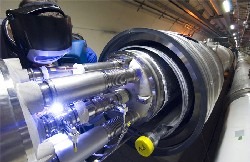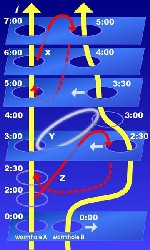|
||
| Excited physicists are expecting first time travelers to appear on the Earth this year. | ||

Large Hadron Collider Welcome, Time Travelers
by Kizilova Anna February
12, 2008
Physicists of the world cannot wait for the Large Hadron Collider (LHC) to be launched. This expensive – LHC is worth 4.65 billion pounds – device is the most powerful particle accelerator ever made in this world. Scientists expect the collider to reveal new facts about particles and forces of surrounding space, as well as simulating environment after so-called “Big Bang”, which created our Universe. Russian scientists, fellows of Steklov Institute of Mathematics claim this experiment, which will be performed in CERN (European Organization for Nuclear Research) near Geneva, may result in creating of a first time machine in the world. LHC is scheduled for launch this summer, thus 2008 may become a reference point for traveling to the past. The idea of traveling in time was born in the genial brain of Kurt Gödel, Albert Einstein’s colleague, who used relativity theory for proving possibility of traveling to the past. Gödel’s hypothesis was published in 1949 and since that time eminent physicists kept rebutting his idea, because time travels shake causality principle and threaten our life with paradoxes: time traveler can accidentally or intentionally kill his own grandfather and thus won’t be born ever.
This scheme crosses with the theory, which appeared in 1988, when American physicists from California Institute of Technology demonstrated that time and space tunnels – “wormholes” – can serve for traveling in time. Russian scientists keep thinking that LHC is able to form wormholes, thus providing necessary conditions for time traveling. “We know that closed time-like curves and wormholes appear as a result of particle colliding”, they say. However, there are many barriers on the way to time traveling. One of them is the size of mini-wormholes, allowing only subatomic particles to pass through them. This problem requires further studies. Scientists hope that LHC will demonstrate such wormholes really exist. If collision energy partly disappears, this can be explained by formation of particles, which pierce time via wormholes.
However, American physicists do not agree with their Russian colleagues – researchers from New-Hampshire claim existing data do not preclude the presence of dark or “phantom” energy, however, talks about possible time machine in LHC are just speculation. Eminent physicist from Oxford stands for time traveling, but only for fundamental theory. In practice, mechanism for visiting the past won’t work. Another contradiction for time traveling is that billions of cosmic rays have pierced Earth’s atmosphere for billions of years, and their energy is much higher that that of LHC could ever create. If wormholes existed, time travelers should have already arrived. Sources:
February
12, 2008
|
||
| This is a preview of the full article.
New Scientist Full Access is available free to magazine subscribers. To continue reading log in now, on the right. 2008: Does time travel start here? 09 February 2008
AS YOU may have heard, this will be the year. The Large Hadron Collider - the most powerful atom-smasher ever built - will be switched on, and particle physics will hit pay-dirt. Yet if a pair of Russian mathematicians are right, any advances in this area could be overshadowed by a truly extraordinary event. According to Irina Aref'eva and Igor Volovich, the LHC might just turn out to be the world's first time machine. It is a highly speculative claim, that's for sure. But if Aref'eva and Volovich are correct, the LHC's debut at CERN, the European particle physics centre near Geneva in Switzerland, could provide a landmark in history. That's because travelling into the past is only possible - if it is possible at all - as far back as the creation of the first time machine, and that means 2008 could become Year Zero: a must-see for the ... The complete article is 2465 words long.
|
||
| FAIR USE NOTICE: This page contains copyrighted material the use of which has not been specifically authorized by the copyright owner. Pegasus Research Consortium distributes this material without profit to those who have expressed a prior interest in receiving the included information for research and educational purposes. We believe this constitutes a fair use of any such copyrighted material as provided for in 17 U.S.C § 107. If you wish to use copyrighted material from this site for purposes of your own that go beyond fair use, you must obtain permission from the copyright owner. | ||
|
|

 Russian
scientists claim that when collider’s energy concentrates on a subatomic
particle, substance of our Universe, which we know as space-time continuum,
can change, and these changes can be quite strange. Earth’s gravity slightly
curves space-time continuum, and LHC can curve time until it forms a “ring”.
This phenomenon is known as “closed time-like curve”, which in theory allows
returning to the past.
Russian
scientists claim that when collider’s energy concentrates on a subatomic
particle, substance of our Universe, which we know as space-time continuum,
can change, and these changes can be quite strange. Earth’s gravity slightly
curves space-time continuum, and LHC can curve time until it forms a “ring”.
This phenomenon is known as “closed time-like curve”, which in theory allows
returning to the past.
 Another
sticking point in wormholes concept is an exotic force, keeping these tunnels
open for traveling in time. Some scientists tend to think that dark energy,
a mysterious antigravitational force, can be that very force, keeping wormholes
open. If particle collision and dark energy helps to create a wormhole
this year in Geneva, civilizations of the future can find out about this
event in history textbooks and pay us a visit.
Another
sticking point in wormholes concept is an exotic force, keeping these tunnels
open for traveling in time. Some scientists tend to think that dark energy,
a mysterious antigravitational force, can be that very force, keeping wormholes
open. If particle collision and dark energy helps to create a wormhole
this year in Geneva, civilizations of the future can find out about this
event in history textbooks and pay us a visit.
